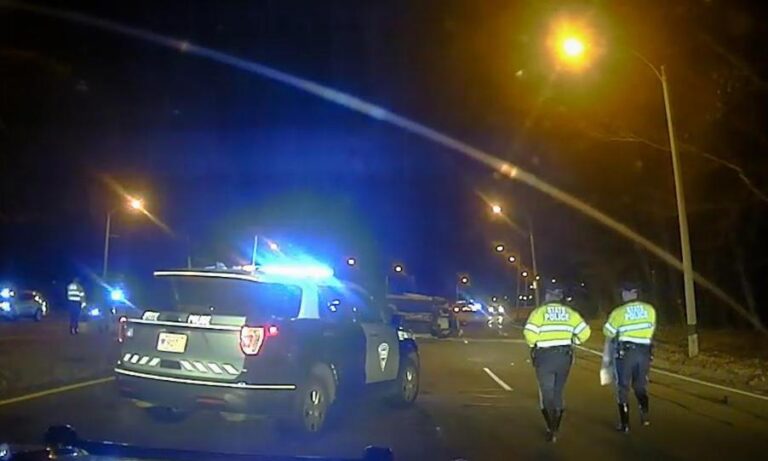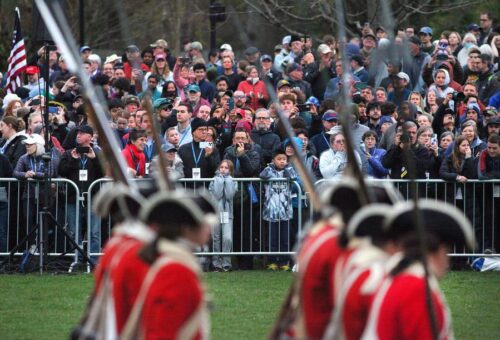Mayor Michelle Wu campaigned for the job on a promise to bring transparency and accountability to the Boston Police Department. But when it comes to determining the role that a Boston police pursuit might have played in a horrific car crash that ended with the deaths of three teenagers, both are sorely lacking.
The crash, which took place in the early morning hours of Jan. 24, 2024, took the lives of Kevin Lemus Davila, 17, the driver of the car, and two passengers, Troy Winslow, 15, and Immanuel A. Brooks, 14. One passenger, who was 15 at the time of the crash and whose name has not been released, survived.
Sixteen months later, the Internal Affairs Division of the Boston Police Department is still investigating the circumstances surrounding the crash. As that investigation drags on, the BPD has refused to comply with a court order to turn over findings on one of the officers involved in the pursuit.
At every level of law enforcement, there is a curious lack of urgency.
It took a year for District Attorney Kevin Hayden to release investigative records requested by the Globe. Meanwhile, Hayden’s office has declined to press criminal charges, did not present the case to a grand jury, and has given no explanation as to why. When asked about it by the editorial board, a spokesperson declined comment.
Asked about the status of the internal affairs report, a spokesperson for Police Commissioner Michael Cox said, “As soon as the investigation is completed, there will be a finding.’’ Asked for a timeline for completion, the spokesperson said, “When there’s a finding in a case, there’s a finding and it’s public.’’ Asked how long an average IAD investigation takes, the BPD spokesperson said only that, “An extensive review process takes place in each case, we give it the time and care required to get it right.’’
According to the Globe report by John R. Ellement and Sean Cotter, the tragic events of that January day began after a Hyundai sped away from two Boston police officers during an early morning traffic stop near the intersection of Gallivan Boulevard and Morton Street on the Dorchester-Mattapan line. The two officers — Matthew Farley and Triston Champagnie — then jumped into their unmarked cruiser, activated the lights and siren, and gave chase. A supervisor told them to stop, per department policy, which states that it’s better to let someone escape than to “unnecessarily jeopardize’’ the safety of the public and the officers.
As reported by the Globe, Champagnie, who was in the passenger seat, verbally acknowledged the command and Farley, the driver, turned the lights and siren off. But they kept following the Hyundai. On Morrissey Boulevard, they turned the lights back on, because they said they wanted to warn other drivers away. Three occupants of the car died after the car accelerated to speeds that reached 106 miles per hour and then crashed.
In this case, the BPD’s failure to produce an internal affairs report could also jeopardize prosecution of a gun possession case. In June 2023, long before the car chase, Champagnie arrested a suspect on firearms charges after the officer found a loaded weapon in the glove compartment of the suspect’s girlfriend’s SUV. The suspect was pulled over by Champagnie either “on the premise’’ that he drove through a red light or the car windows were tinted, said his lawyer, Zachary Cloud.
After learning that Champagnie was under investigation by the Suffolk County DA and the BPD, Cloud told the editorial board that he sought to obtain IAD records on the officer. In response to requests he started making last August, the BPD told him it needed “another 30 days, another 60 days. We got that refrain time and time again,’’ Cloud said.
In December, Suffolk Superior Court Judge James Budreau issued an order calling for BPD to produce unredacted copies of all materials relating to complaints made about Champagnie; unredacted copies of all materials relating to any Internal Affairs Division investigations of Champagnie; and unredacted copies of all material relating to any disciplinary action taken against Champagnie to the office of the clerk by Dec. 12, 2024. That did not happen, and as reported by the Boston Herald, on April 15, Cloud asked the court to hold BPD in contempt and dismiss the case against his client. The case was taken under advisement, with a status conference scheduled for May 21, the Herald reported.
Asked if this matter is something that should be taken up by the Office of Police Accountability and Transparency (OPAT), a civilian police watchdog organization (whose executive director, Evandro Carvalho, was appointed by Wu), a spokesperson for the mayor said, via email, “OPAT’s authority to review BPD internal affairs decisions requires that those investigations must be concluded first before review.’’
The spokesperson said “the city grieves alongside the families and loved ones over the loss of young people with their whole lives ahead of them, and we recognize that the length and sequence of multiple investigations has been challenging for all impacted. Ensuring a full understanding of what occurred on that tragic night is necessary to inform public safety practices and accountability moving forward.’’
Thorough investigations take time, for sure. But the lack of transparency in this case, even in the face of a judge’s order, raises questions about what is reasonable and what is merely a way to slow-walk accountability.

